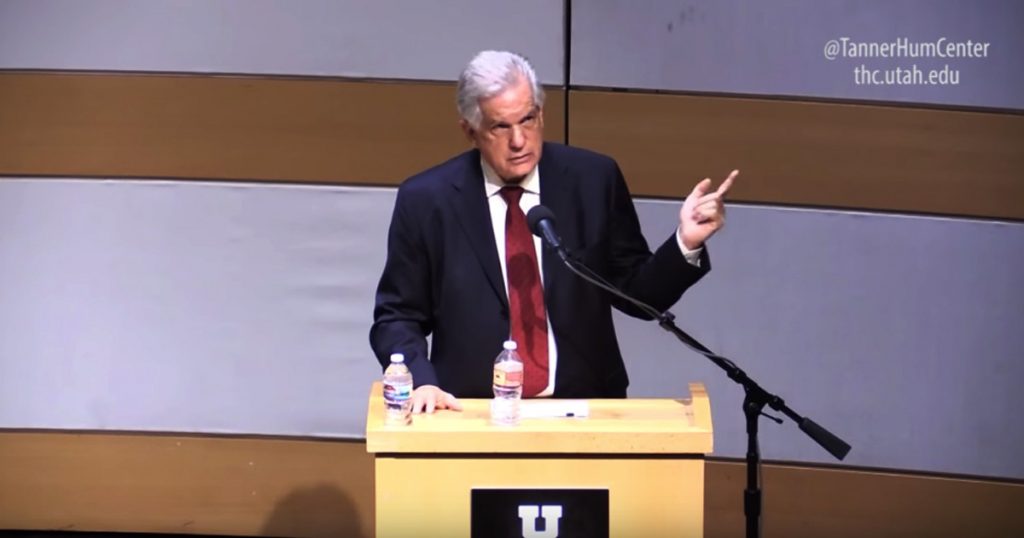Science vs. Dogma: Biology Challenges the LDS Paradigm

by Joel McDonald
On September 27th, 2017, Gregory A. Prince, author and historian, gave 2017 Sterling M. McMurrin Lecture on Religion & Culture, “Science vs. Dogma: Biology Challenges the LDS Paradigm.” The lecture was presented by The Tanner Humanities Center at the University of Utah. Introducing the lecture, the Tanner Humanities Center published:
Until the late 1960s, when the Stonewall Riots in New York City brought LGBT issues into the public square, the consensus among clinicians, scientists, legislators, and religious leaders was that homosexuality was either an unfortunate choice that could be unchosen, or a disease that could—and must—be cured. As the field of molecular biology matured, there was a spirited hunt for a genetic explanation for homosexuality—the “gay gene.”
In the short term, failure to find such a gene reinforced the “choice paradigm” of homosexuality. However, recent research has shown that a combination of genetic and (mostly) epigenetic factors act during fetal development to imprint sexual preference and gender identity indelibly within the brain. Prince argues that the “biology paradigm” calls for a reassessment of Latter-day Saint doctrines, policies, and attitudes towards homosexuality, all of which were built on a foundation of the “choice paradigm.”
“Greg Prince’s unique perspective,” said Tanner Center director Bob Goldberg, “combines scientific knowledge with humanistic sensibilities. This insures that his insights will offer new ways of understanding matters that touch us all.”
Prince’s lecture walks through what science has discovered so far regarding the biological causes of homosexuality, discussing both genetic and epigenetic factors that studies indicate lead a person to be homosexual. This lecture no doubt leaves the listener with much to consider regarding the science of homosexuality. Hopefully, the acknowledgment of these scientific findings will open the minds and hearts of all people as they consider the conflict between laws, policies, doctrines, and dogma that run counter to this new understanding.
With an eye toward the future, Prince closes his lecture with this:
Perhaps the most potent force is the maturation of millennials who simply reject this status quo. As these church members, assuming they hang around long enough, move up through the hierarchical pyramid, they are likely to bring along their worldview and challenge not only policies but doctrines. They will be emboldened by an increasingly informative body of scientific knowledge about homosexuality, by the fact that doctrinal change has been a fact of life for Mormonism since its founding, and by a profound sense of social justice that will no longer allow injury or death to one of the church’s most vulnerable constituencies. If they take the time to read their own history, they will understand that not a single significant LDS doctrine has gone unchanged through the entire history of the church. And when they come to that understanding, they will look forward instead of backward, embrace fully the foundational concept of continuing revelation, line upon line, and institute change at the most fundamental level.
Science matters. If we embrace the findings of science, that sexual orientation and gender identity are biologically indelibly imprinted during fetal development and that they are varieties of normal, then we become a more just society as well as recipients of the enormous gifts that LGBT people bring to the table. But if we reject the findings of science and insist that homosexuality is just a bad choice that can be unchosen, all of society suffers. The extent and timing of any changes in LDS policy or doctrine cannot be predicted with any accuracy. What can be predicted, and with substantial confidence, is that because LGBT issues are the civil rights issues of our time as well as the moral issues of our time for millennials, the composition and vitality of the future church will be reflective of its ability to project moral authority on these issues.
Gregory Prince’s new book “Gay Rights and the Mormon Church: Intended Actions, Unintended Consequences” is being released on February 28th, 2019. It is available for pre-order on Amazon.
Thank you